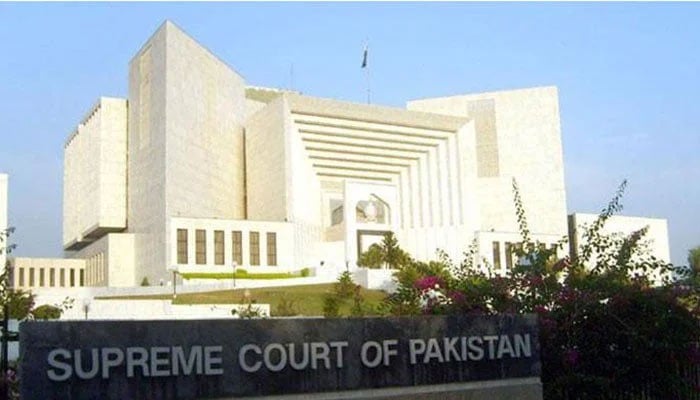Supreme Court returns SCBA’s plea against MPs’ lifetime ban
ISLAMABAD: The Supreme Court of Pakistan has returned a petition of the Supreme Court Bar Association challenging the lifetime disqualification of parliamentarians after raising objections to it.
Supreme Court Bar Association (SCBA) President Ahsen Bhoon had filed a constitutional petition in the Supreme Court under Article 184 (3) of the Constitution, praying it to declare that the declaration by a court of law under Article 62(1)(f) only applies to the election under question and does not entail a perpetual/lifetime bar.
He had also prayed the court to declare that the proceedings/declarations under Article 184(3) or 199 of the Constitution do not constitute declarations by a court of law as per the principles expounded by the court. However, the Registrar office of the Supreme Court has returned the petition with the objections that the court had already given its verdict in the matter.
Similarly, it was also stated that the review petitions filed in the matter had been dismissed, hence once a decision is given on review petitions, it could not be filed again.
Meanwhile, Supreme Court Bar Association President Ahsen Bhoon told the media at the Supreme Court that he would file an appeal against the objections raised by the Registrar office and the application would be shared with the media. “I hope new Chief Justice Umar Ata Bandial will consider the appeal,” Bhoon said
In his petition, Ahsen Bhoon had submitted that it was necessary to reconcile the jurisprudence of the court to consider whether the denial of the right to an appeal — that results in a lifetime disqualification — is violative of the fundamental rights of such persons, as well as their potential voters. He recalled that the apex court had identified certain due process protections afforded to a candidate/member of Parliament for a court/tribunal to make a declaration in terms of Article 62(1)(f) of the Constitution.
He had contended that in Samiullah Baloch’s case, the Supreme Court upheld the principle that the disqualification was perpetual as held in the Abdul Ghafoor Lehri case, because adequate remedies were available to anyone against whom such declaration was given. “However, what has not been addressed is that in the absence of a right of appeal against a ruling given by this court under Article 184(3), no adequate remedy is available,” Ahsen Bhoon had contended in his petition.
-
 Blac Chyna Reveals Her New Approach To Love, Healing After Recent Heartbreak
Blac Chyna Reveals Her New Approach To Love, Healing After Recent Heartbreak -
 Royal Family's Approach To Deal With Andrew Finally Revealed
Royal Family's Approach To Deal With Andrew Finally Revealed -
 Super Bowl Weekend Deals Blow To 'Melania' Documentary's Box Office
Super Bowl Weekend Deals Blow To 'Melania' Documentary's Box Office -
 Meghan Markle Shares Glitzy Clips From Fifteen Percent Pledge Gala
Meghan Markle Shares Glitzy Clips From Fifteen Percent Pledge Gala -
 Melissa Jon Hart Explains Rare Reason Behind Not Revisting Old Roles
Melissa Jon Hart Explains Rare Reason Behind Not Revisting Old Roles -
 Meghan Markle Eyeing On ‘Queen’ As Ultimate Goal
Meghan Markle Eyeing On ‘Queen’ As Ultimate Goal -
 Kate Middleton Insists She Would Never Undermine Queen Camilla
Kate Middleton Insists She Would Never Undermine Queen Camilla -
 Japan Elects Takaichi As First Woman Prime Minister After Sweeping Vote
Japan Elects Takaichi As First Woman Prime Minister After Sweeping Vote -
 King Charles 'terrified' Andrew's Scandal Will End His Reign
King Charles 'terrified' Andrew's Scandal Will End His Reign -
 Winter Olympics 2026: Lindsey Vonn’s Olympic Comeback Ends In Devastating Downhill Crash
Winter Olympics 2026: Lindsey Vonn’s Olympic Comeback Ends In Devastating Downhill Crash -
 Adrien Brody Opens Up About His Football Fandom Amid '2026 Super Bowl'
Adrien Brody Opens Up About His Football Fandom Amid '2026 Super Bowl' -
 Barbra Streisand's Obsession With Cloning Revealed
Barbra Streisand's Obsession With Cloning Revealed -
 What Did Olivia Colman Tell Her Husband About Her Gender?
What Did Olivia Colman Tell Her Husband About Her Gender? -
 'We Were Deceived': Noam Chomsky's Wife Regrets Epstein Association
'We Were Deceived': Noam Chomsky's Wife Regrets Epstein Association -
 Patriots' WAGs Slam Cardi B Amid Plans For Super Bowl Party: She Is 'attention-seeker'
Patriots' WAGs Slam Cardi B Amid Plans For Super Bowl Party: She Is 'attention-seeker' -
 Martha Stewart On Surviving Rigorous Times Amid Upcoming Memoir Release
Martha Stewart On Surviving Rigorous Times Amid Upcoming Memoir Release




